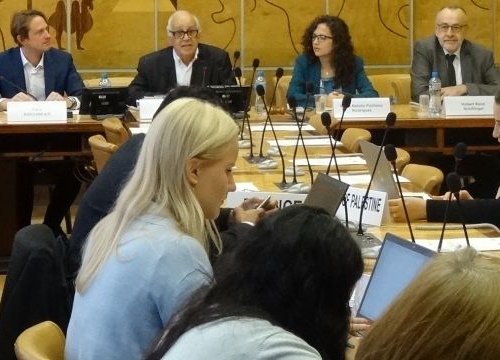Experts Gather to Discuss the Implementation of the UN Declaration on the Rights of Peasants


Friedrich-Ebert-Stiftung
5 November 2018
On Friday 28 September 2018, the United Nations (UN) Human Rights Council (HRC) adopted the UN Declaration on the rights of peasants and other people working in rural areas (UN Declaration). What roles states, civil society organizations, social movements and international organizations should play in implementing the UN Declaration? What lessons can be learned from the implementation of the UN Declaration on the rights of indigenous peoples?
Our expert seminar, co-organized with the Government of Switzerland, the Permanent Mission of Bolivia to the United Nations in Geneva, and the Friedrich-Ebert-Stiftung, precisely aimed at debating these questions.
On 31 October 2018, at the Palais des Nations, more than 60 participants – academics, experts, diplomats, representatives of non-governmental organizations and social movements – gathered to discuss examples of good practices that could be replicated in implementing the UN Declaration, such as the recognition of the rights of peasants in national constitutions, laws, policies and programmes, increased collaboration between UN agencies, and practical tools produced by civil society and social movements.
‘The adoption of the UN Declaration is the outcome of more than ten years of work by social movements, civil society organizations, experts, and academic institutions like the Geneva Academy’ underlines Dr Christophe Golay, Special Adviser on Economic, Social and Cultural Rights at the Geneva Academy and Coordinator of our research project on the rights of peasants.
‘Its implementation at the national and international levels, for example through making sure that the right to land is guaranteed for peasants and their communities, and that the right to seeds has precedence over property regimes or trade agreements, is key to ensure the rights of peasants and, ultimately, significantly improve their situation on the ground. This expert seminar is a first step towards this implementation’ stresses Dr Christophe Golay.

About our Research Project on the Rights of Peasants
As human beings, peasants and other people working in rural areas, including those working in small-scale and traditional agriculture, fishing, herding and hunting activities, are entitled to all human rights. However, their vulnerability remains a particular concern. They represent 70 percent of people living in extreme poverty and 80 percent of the world’s hungry. Many are victims of multiple discrimination and human rights violations and are not effectively protected by the International Labour Organization (ILO) conventions because they are not engaged in the formal sector.
Our research project aims to support efforts to strengthen the promotion and protection of the rights of peasants and other people working in rural areas. After having provided academic support to the negotiation of the UN Declaration for ten years, we focus on the implementation of the UN Declaration through publications, conferences, expert seminars, and training courses.











